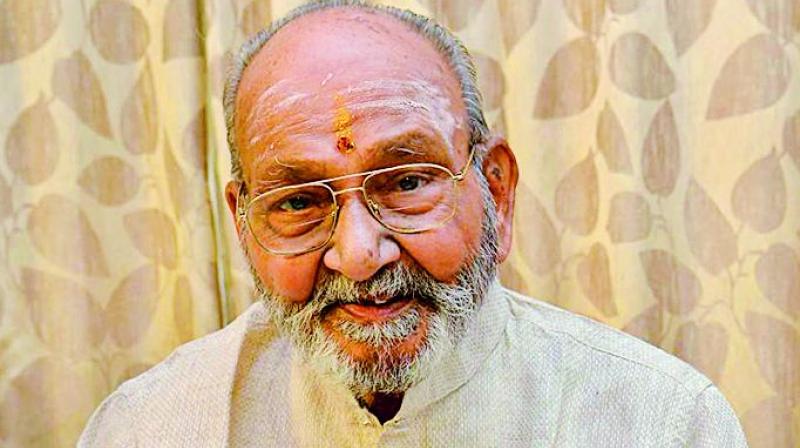This award is a stepping stone, says K Vishwanath on Dadasaheb Phalke honour
A storehouse of talent, a master of his craft and a revivalist of Indian art and culture in cinema.

Days after being honoured with the Dadasaheb Phalke Award, acclaimed director K. Viswanath puts things in perspective for those who believe the recognition came a tad too late.
“The award came at the right time. When I went to receive my Padmashree a few years ago, some of the other recipients couldn’t walk, talk, see or sit properly. Thankfully, I am fine. So I would like to thank the government for recognising me with this award,” explains the 87-year-old.
The veteran director feels that the award encourages him to keep at his passion. “This award is a stepping stone. There is still a lot to do. If I feel this is the greatest moment of my life and there is nothing more to achieve after this, it will mark the beginning of my fall,” he remarks, adding, “Age poses no bar for creativity. As long as your mind and senses are functioning well, you can work.”
Viswanath, who made his debut with Aatma Gowravam in 1965 for Annapurna Pictures, says, “I never expected to clean the society with my films. But I put together some rules and ethics for myself, which I followed throughout my career.”
He adds, “My policy was that even if I couldn’t help anyone, I shouldn’t harm them. That’s how I made all my films. By God’s grace, they were successful.”
His journey
As a young graduate, Viswanath first took up the job of a sound recordist. “My elders sent me to Madras for work, so I joined Vahini Studio,” he recalls, adding, “I worked for many films and shared creative inputs with filmmakers, and that led me to direction.”
Soon, he was spotted by Akkineni Nageswara Rao, Dukkipati Madhusudhana Rao and Adurthi Subba Rao, who provided him with the space to hone his skills. He worked as an assistant director for a few films before making his debut.
As a director, the story was always a priority for Viswanath, who was already several films old when Sankarabharanam released in 1979. Though the film had no big names to its credit, it still became a roaring success, even winning international recognition. “All my stories are original and come from observing life, be it different environments or people,” he says.
Character, not star power
A true storyteller, Viswanath says he always wanted characters to be portrayed by actors who naturally looked the part. Admitting that signing actress Manju Bhargavi for Sankarabharanam was a huge risk, he says, “The role was very intense. There was some apprehension about how she would be accepted by the public as the character was unlike any role she had done before. But she acted very well.”
He adds, “After writing the story, I told them that the actor should be someone without a star image. When we found JV Somayajulu, I knew he was perfect for the role.”
Viswanath’s next big hit, Sagara Sangamam, was born from a request by Kamal Haasan to the director. “He told me that he wanted to play a non-commercial role. I knew that he was a dancer and had worked as a choreographer on projects with other directors. So I thought of a story that centred around dance,” says Viswanath about the 1983 release, which proved to be a runaway success.
Interestingly, Viswanath has never attempted a biopic or mythological film. “I am scared. A biopic should be as authentic as possible, not fiction,” he says. He even dropped a project on musical great M.S. Subbulakshmi’s life, for which he had approached actress Radhika. “It was to be called Vidushimani. But I opted out as I was scared about missing any facts,” he admits.

